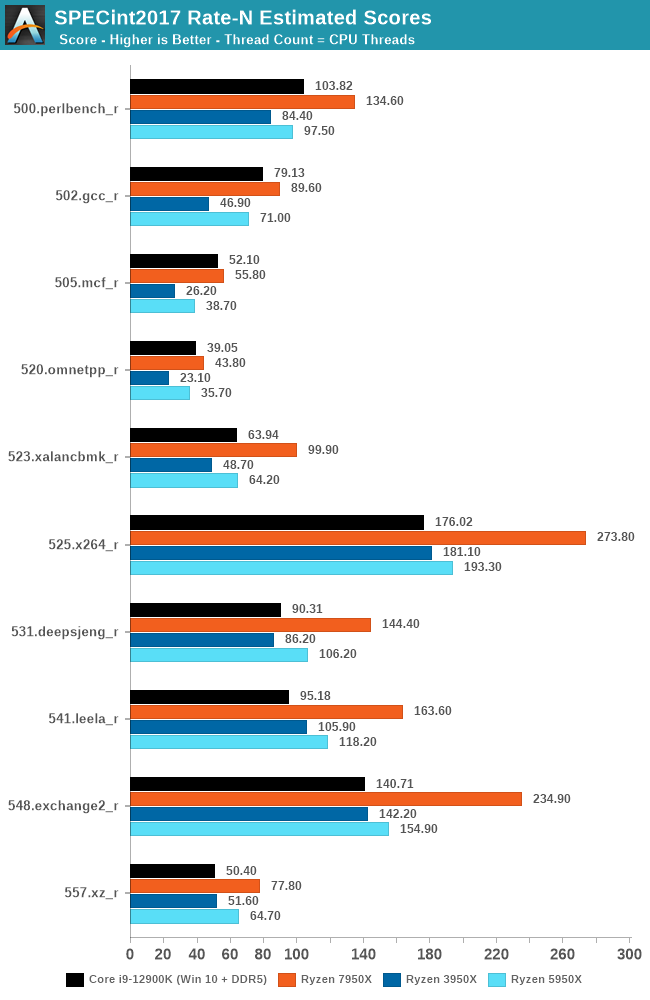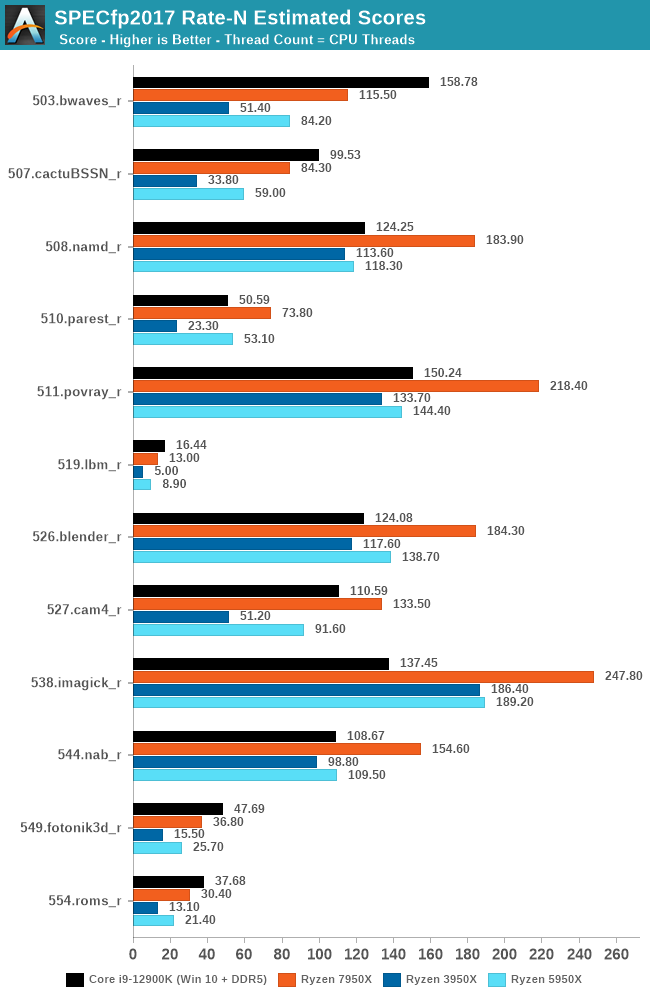AMD Zen 4 Ryzen 9 7950X and Ryzen 5 7600X Review: Retaking The High-End
by Ryan Smith & Gavin Bonshor on September 26, 2022 9:00 AM ESTSPEC2017 Multi-Threaded Results
Although single-threaded performance is important and Zen 4 has a clear advantage here, multi-threaded performance is also very important. Some variables to consider when evaluating multi-threaded performance is that desktop processor designs typically boost a single core higher, with the rest lagging in frequency behind to either stay under the thermal (TJMax) or power (TDP) envelopes. Some manufacturing processes are more efficient by design due to extensive R+D and product management, with Zen 4 looking to be much more in terms of perf per watt over Intel's Alder Lake architecture.
In the instance of the AMD Ryzen 9 7950X, it has a clear advantage over its predecessors in that it not only has a higher single core boost (5.7 GHz versus 4.9 GHz), but it also has a higher TDP than the Ryzen 9 5950X (170 W versus 105 W. This increase in TDP not only allows for a higher frequency, but it allows for a higher frequency spread across all of the cores when under full load.

Opening up our look at our SPECint2017 NT results, and we see a similar uplift in performance gains as we did in the single-threaded tests. In tests such as 500.perlbench_r, the Ryzen 9 7950 is 38% ahead of AMD's previous generation Ryzen 9 5950X, which is impressive. In 523_.xalanbmk_r, the Ryzen 9 7950 is 55% ahead of the Ryzen 9 5950X, and over 100% better in performance over the Zen 2-based Ryzen 9 3950X.

In our SPECfp2017 NT testing, certain workloads such as in 538.imagick_r showed massive increases in performance over previous generations, with a 30% uplift in performance over Zen 3. The difference here between Zen 3 and Zen 2 was marginal (10%), but Zen 4 is a more efficient core architectural design, with many improvements across the board playing a hand here; the switch to DDR5 versus DDR4, more cache per core, higher frequency, higher TDP, etc.
Overall AMD's Zen 4 architectural differences and improvements show that not only does AMD have the crown for single-threaded performance, but it's also ahead in multi-threaded performance too, at least from our SPEC2017 testing. As always when Intel or AMD makes a claim on IPC performance increases, AMD seems to be about right with claims of around 29% in ST performance and even more so in MT performance.










205 Comments
View All Comments
Tom Sunday - Friday, September 30, 2022 - link
Just today received a special sales notice from Micro Center giving away FREE 32GB DDR5 with any purchase of a Ryzen 7000 series CPU. I wonder if AMD is sponsering such a sales push and this early in the game? Giving away a $190 value is a big deal in the trying times of today! ReplyCastillan - Sunday, October 2, 2022 - link
I suspect that's a Microcenter specific deal only. The RAM is 5600 at a fairly high latency (I think it was CAS40?). DDR5 prices have plummeted as well. The memory I picked up from Microcenter was 6600/CAS34 and marked down to 279 from 499.I'd guess that they have a surplus of a certain stock item that wasn't selling, and decided to use this promo to offload unwanted stock and still look good. Reply
imaskar - Friday, September 30, 2022 - link
It would be really great to add code compilation tests: Java, Go, C++ (linux kernel), Rust. Replydizzynosed - Saturday, October 1, 2022 - link
Si what shall I buy? Intel, amd, ??? Which cpu?? I only game. Replyrocky12345 - Saturday, October 1, 2022 - link
What's wrong with the gaming scores on the 7000 series there is no way a 5000 series should be able to match or beat a 7000 AMD CPU. I know this because I have a AMD Ryzen 5900x properly setup and tweaked. AMD is said to have sent DDR5 6000 with the test CPU's and asked the reviewers to use that to test with. Lets face it 97% of the people buying a new AMD Zen 4 setup or Intel 12th gen are not going to be using bargain basement low speed ram and if they do happen to buy cheaper ram most are more than likely to try and run it at the highest speed possible. did I read that right you used CL44 DDR5 5200Mhz talk about dead heading performance.Also maybe I missed it but what was the Intel test system setup? other than that it was a decent review. I never have seen Ryzen 5000 that close in gaming I guess using slow DDR5 knee jerks Ryzen 7000. My own ram is running at CL16 4000Mhz 2000IF and at the reported number in the review if I had the same video card I would be either faster or only slightly slower than the test results here for games and that would give me false hope that my Zen 3 was faster than it really is lol. Reply
Oxford Guy - Sunday, October 2, 2022 - link
The only way you're going to see movement on this is if you lobby AMD to abandon JEDEC.This site sees JEDEC as all there is. Reply
GeoffreyA - Monday, October 3, 2022 - link
I think it's about keeping a common baseline of memory speed, especially since Anandtech's database is about having parts directly comparable. ReplyOxford Guy - Monday, October 10, 2022 - link
That’s not the reason that has been given again and again and it’s a terrible one anyway. The parts are different. The memory that goes best with those parts differs. ReplyGeoffreyA - Tuesday, October 11, 2022 - link
They should have set all the systems to DDR4 3200 and called it a day. Replybyte99 - Sunday, October 2, 2022 - link
I'm a bit confused. When Anandtech was doing their efficiency analysis, it seemed they were taking the 65W Eco mode label as the actual package power, instread of actually measuring it (as they usually do). When Ars Technica measured the package power of the 7950X and 7600X in 65w Eco Mode, they found it was 90W for both.[ https://arstechnica.com/gadgets/2022/09/ryzen-7600... ]
Did Anandtech miss something obvious, or am I missing something? Reply